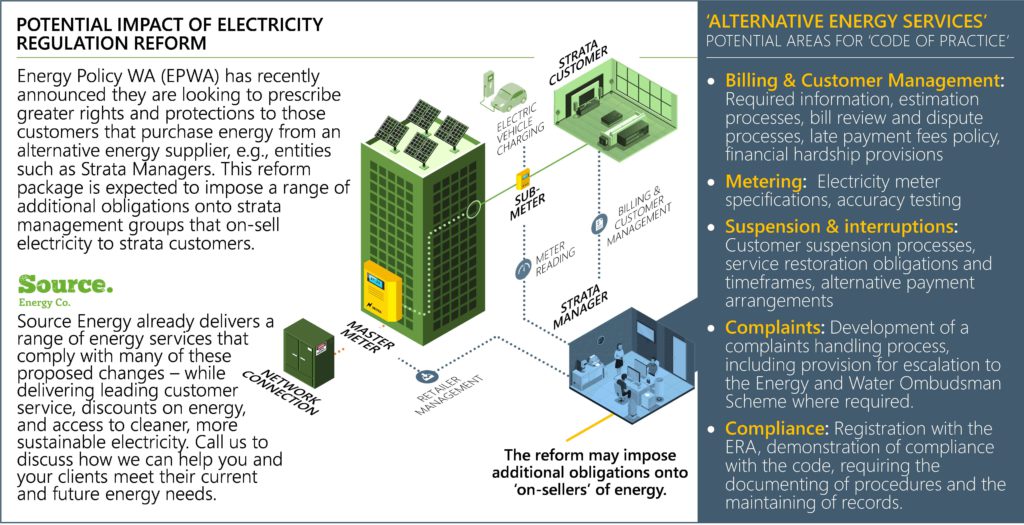Did you know that consumer protections and rights are weaker for customers that purchase energy from a Strata Manager (as well as other on-sellers) when compared to those that purchase from an authorised energy retailer such as Synergy? No? Don’t worry, your strata customers probably don’t know either.
In recent months, Energy Policy WA (EPWA) has announced they are looking to review the protections available for consumers of alternative electricity services and has made a number of recommendations in this regard. Following on from this review, we expect that within the next two years EPWA may introduce policy changes for those customers that purchase energy from an ‘on-seller’, that is, entities such as Strata Managers that purchase electricity through a master-meter, then ‘on-sell’ this energy to the residents of the complex (usually via a sub-meter arrangement).
EPWA are exploring potential next steps, which includes a new code of practice for alternative electricity service providers (AES Code), implementing registration requirements for prospective providers, introducing enforcement and compliance obligations, and allowing customer access to the Energy and Water Ombudsman to resolve disputes.
We expect the AES Code policy changes to be enforced by the end of 2022 along with the first code of practice for behind-the-meter generation and storage services (Solar and Batteries). Other AES that could be prescribed in the future include business models providing embedded network services and electric vehicle charging stations.
What does this mean for members of the strata management community? Although this reform is still being considered, we expect that at a minimum, any reform will consider additional obligations for behind-the-meter services and on-sellers of electricity. Although we agree this is a positive change for tenants and residents in a strata scheme – it could increase the administrative and compliance workload for many of the strata management community.

Based on what we’ve already heard and what we’ve seen in other Australian States, the code could introduce obligations in the following areas:
- Billing & customer management: Required information that must be provided to customers before they enter into an agreement, estimation processes, bill review and dispute processes, late payment fees policy, financial hardship provisions.
- Metering: Electricity meter specifications, accuracy testing.
- Suspension and interruptions: Customer suspension processes, service restoration obligations and timeframes, alternative payment arrangements.
- Complaints: Development of a complaints handling process, including provision for escalation to the Energy and Water Ombudsman Scheme where required.
- Compliance: Registration with the Economic Regulation Authority, demonstration of compliance with the code, requiring the documenting of procedures and the maintaining of records.
If you are not prepared for these enhanced obligations, then don’t worry, the reform is still in the early drafting phase and we don’t expect anything will be formalised until late 2022. In the meantime, consider this – Source Energy already provide energy services that are compliant with many of these proposed changes. Through our Integrated Energy Network services, we can deliver cheaper, more sustainable energy supply to your customers, while also significantly reducing the administrative and regulatory burden you face as strata managers.
Give us a call if there is anything you want to discuss about these potential changes, or how we can help you with your current and future energy needs.
If you are interested in finding out more about these regulatory reforms, you can access further information on the EPWA’s website here.
